SINGAPORE: SMRT has come under public scrutiny for downplaying a recent spate of train service disruptions across multiple MRT lines, asserting that they are isolated incidents rather than signs of systemic issues in Singapore’s rail network.
SMRT President Lam Sheau Kai told reporters on 17 September that the spate of disruptions across multiple MRT lines were unrelated events.
“These are isolated cases, not systemic issues,” he said during a media address, without taking any questions.
Lam added that the operator is working closely with the Land Transport Authority (LTA) to strengthen long-term rail reliability.
Planned measures include technical audits, infrastructure upgrades, and improvements to fault recovery processes.
He emphasised that in each recent incident, SMRT staff acted swiftly to ensure commuter safety and implement recovery measures, including the deployment of free bus bridging services.
“To reinforce reliability, we will strengthen lifecycle management of our rail system and accelerate asset renewal and upgrading where needed,” Lam said.
SMRT will also conduct comprehensive technical audits of critical systems such as power, signalling, trains, and track infrastructure, aiming to identify operational gaps and enhance incident response protocols.
Lam acknowledged that safety checks during incidents typically take two to three hours but said the operator would explore methods to reduce recovery time without compromising safety.
Commuters Question “Isolated” Claims
Despite reassurances, many netizens argued that multiple “isolated” faults within a short period suggest systemic problems rather than mere coincidences.


Some users pointed out that framing the incidents as unrelated may be worse, as it implies multiple issues are happening simultaneously.
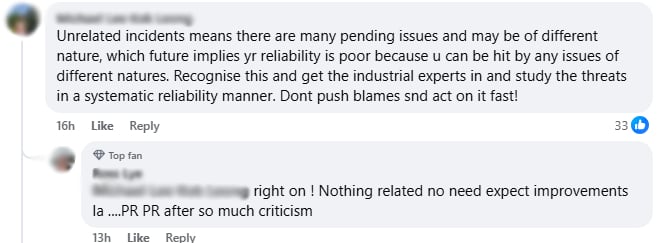


One user wrote, “People don’t need you to assure us whether these are isolated cases or not… people need you to assure reliability and no breakdown. Get our concern right and work on it!”
Thomson–East Coast Line Breakdown
SMRT’s statement came after the suspension of train services on the Thomson–East Coast Line (TEL) on the morning of 17 September 2025, caused by a signal fault that disrupted the 27-station stretch from Woodlands North to Bayshore.
The first alert was issued at 7.29am via X and Facebook, advising commuters to expect an additional 15 minutes of travel time. At that stage, regular services were still operating.
By 7.55am, SMRT announced that free regular bus services were running along the entire affected stretch, indicating a wider disruption.
At 8.29am, the operator confirmed that all train services on the line were suspended to facilitate recovery efforts.
Bridging buses were deployed to connect stations, while commuters were encouraged to use alternative rail lines.
Train services began progressively resuming from 8.38am and were fully restored by 8.54am, bringing an end to a disruption that lasted more than two hours.
SMRT apologised for the inconvenience caused.
On social media platforms such as Reddit and Facebook, however, netizens expressed frustration that SMRT had understated the severity of the disruption, advising commuters to expect an additional 15 minutes of travel time when delays were, in fact, much longer.
Netizens urged the operator to provide “accurate and factual timings” instead of issuing what they felt were minimised estimates.

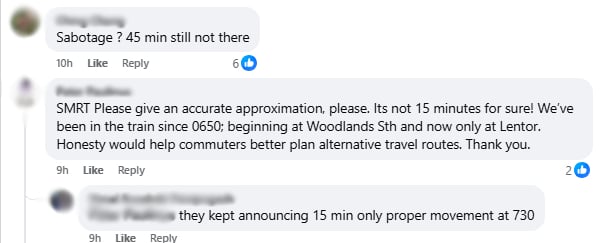



One user said the 15-minute announcement “does not reflect the situation on the ground” and expected timely announcements with better management.
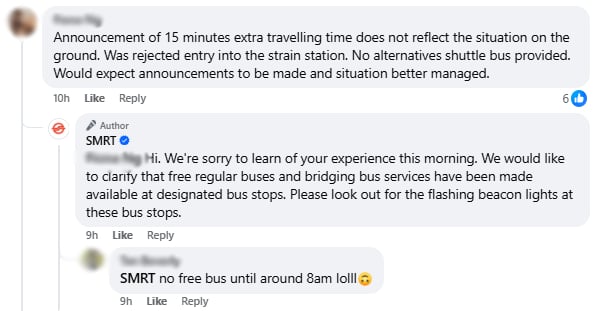
Several users also observed that the disruption appeared to have started earlier than officially acknowledged.
One pointed out that the breakdown was only announced at 8am, even though trains had already stalled beforehand.
Another noted that the problem had started around 6.30am, but staff initially said the delays would be brief, so it was not classified as a breakdown.
Other users shared experiences of being stuck on trains since 6.41am and 7.10am, with announcements repeatedly stating “15 minutes additional travel time.”
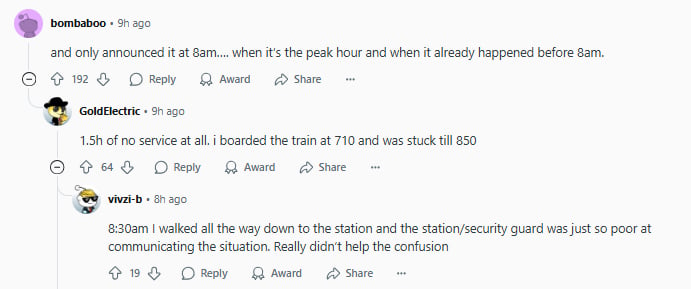
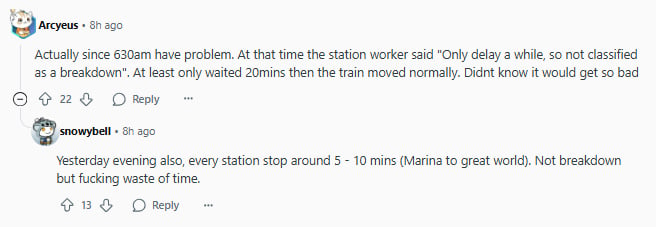


One user criticised the lack of timely communication, questioning why announcements were not made immediately so commuters could plan alternative routes.
“Instead, there was no information notifying commuters on the delays and subsequently all did not know what was going on,” the user wrote, suggesting communication may not be prioritised.

Calls for Accountability
Beyond complaints about communication, some netizens raised broader concerns over the frequency of recent breakdowns.
They noted that such incidents are becoming too frequent, suggesting that the issue may lie not with the signalling but with management.
They called for a thorough investigation to identify the root cause and urged the Land Transport Authority (LTA) and other relevant authorities to take greater responsibility in addressing the problem.
“These incidents greatly affect commuters. The Ministry of Transport must have zero tolerance on such mishaps,” one user said.

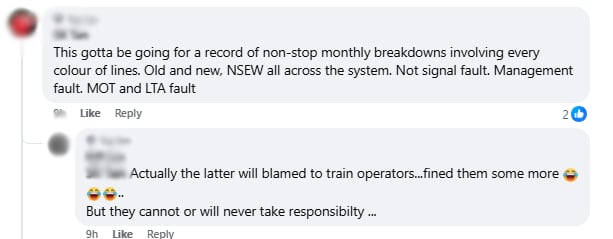

Another wrote: “If we don’t get to the root of the problems, we can only expect more breakdowns.”

One commuter added that while occasional faults are tolerable, as machines and systems can break down from time to time, the recent frequency of issues is a cause for concern.
Given that the TEL is a new line, the user questioned whether the system testing was robust enough or if the quality of the installed equipment was adequate.

Recent Spate of Disruptions
The TEL incident on 17 September marked the second rail disruption within 12 hours.
On the night of 16 September, a power supply fault had affected services across six stations on the East–West Line.
The disruptions follow a string of incidents in recent weeks.
On 13 September, services on the Punggol LRT were halted for about three hours after a system fault prevented trains from being launched from the depot.
Earlier, on 2 September, a train fault on the North–South Line caused a 25-minute delay between Woodlands and Yishun stations.
In August, several prolonged faults disrupted services.
On 12 August, a power failure led to a five-hour suspension on the Sengkang–Punggol LRT, while another power issue on 15 August caused services to be halted for more than three hours across all 29 stations on the same network.
On 6 August, the East–West Line suffered a five-hour breakdown.
The problems stretch back to July, when the TEL experienced an hour-long disruption due to a signalling fault, and the Bukit Panjang LRT saw two suspensions in the same month as a result of power problems.
The post SMRT faces backlash as commuters question ‘isolated’ train breakdown claims appeared first on The Online Citizen.


